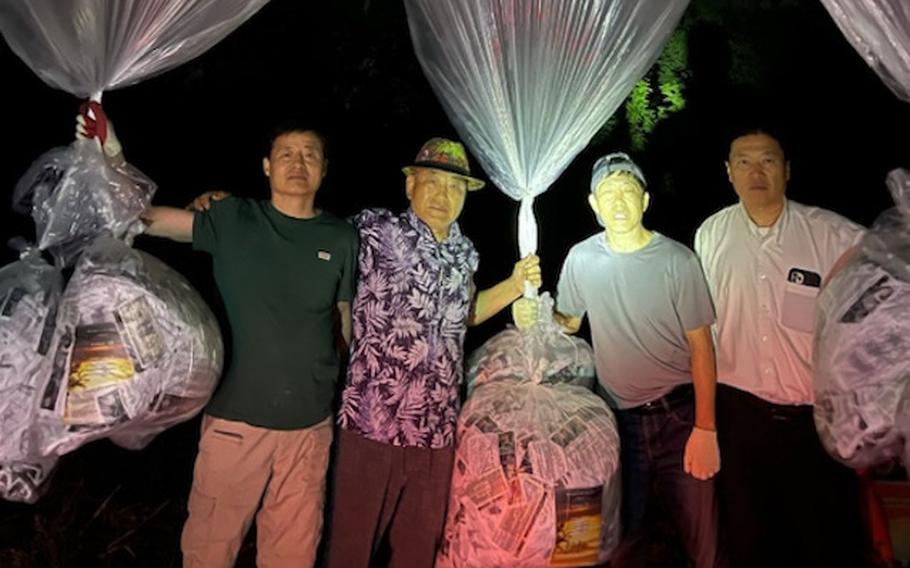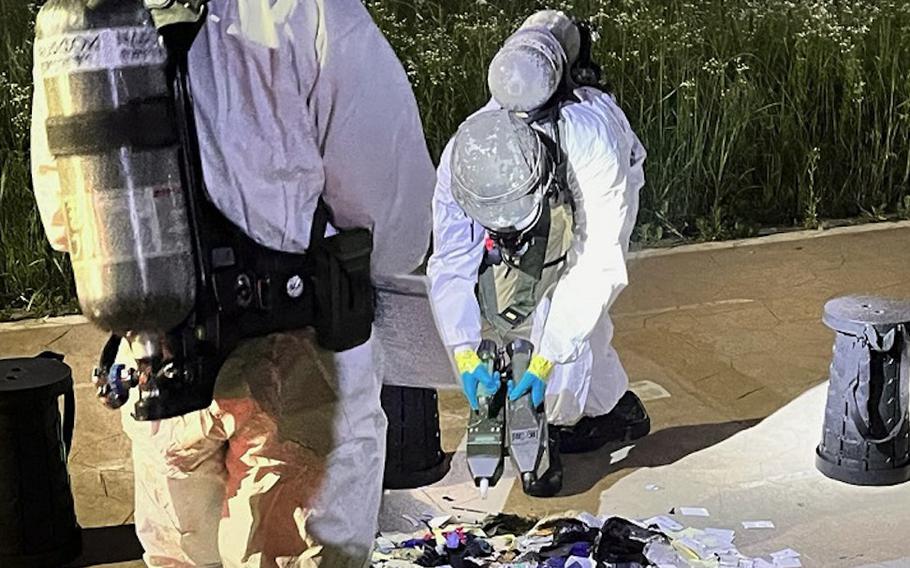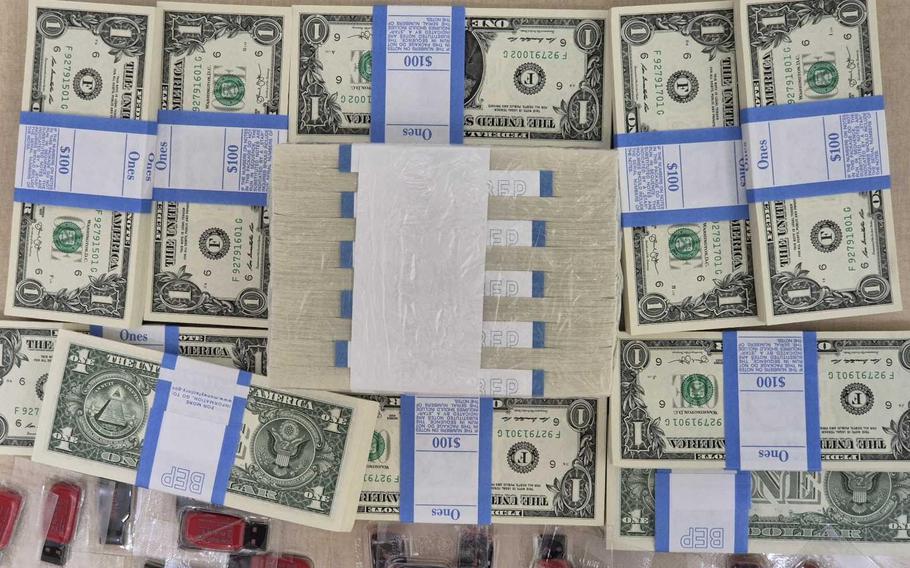
South Korean activists pose before sending balloons to North Korea from an undisclosed location, June 6, 2024. (Fighters for a Free North Korea)
SEOUL, South Korea — Activists who drew official North Korean ire for sending balloons carrying humanitarian supplies across its border say they will continue their decades-long campaign, despite the North’s in-kind retaliation against the South.
North Korea launched over 1,200 balloons tethered to bags of trash toward its southern border between May and June, with some of them reaching as far as South Gyeongsang province, roughly 170 miles below the border, according to South Korea’s Joint Chiefs of Staff.
Some of the balloons and their contents, such as batteries, cigarette butts, scrap paper, manure and other household trash, landed on vehicles and roofs, prompting Seoul and other provinces to issue mass-alert warnings by cellphone.
The trash-laden balloons were a response to balloons launched by South Korean activists toward the north, according to reports from North Korea’s state-run Korean Central News Agency.
“Mounds of wastepaper and filth will soon be scattered over the border,” North Korean Vice Defense Minister Kim Kang-il said in a May 26 KCNA report, two days before the North’s balloons appeared.

South Korean troops inspect the trash carried by a balloon from North Korea to Seoul, South Korea, on June 1, 2024. (South Korean Joint Chiefs of Staff)
One of these South Korean groups, Fighters for a Free North Korea, has sent humanitarian aid and anti-Pyongyang propaganda leaflets to the North since the group’s founding in 2003.
The 10-member organization based in Seoul solicits online and direct-deposit donations to fund their campaign “for the freedom of North Koreans,” chairman Park Sang Hak said by phone May 31.
The group on Thursday sent 20 large balloons carrying roughly 300,000 propaganda leaflets, 3,000 U.S. one-dollar bills and 5,000 USB thumb-drives containing South Korean music and TV shows, according to a statement from the group that day.
Free North Korea Radio, a separate group of five North Korean defectors based in Seoul, has sent about 900,000 propaganda leaflets and shortwave radios by balloon since last year, group chairman Kim Seongmin said by phone June 3. He said the group sent over 6,000 plastic bottles containing rice and medicine through the Yellow Sea during the same one-year period.
Former South Korean President Moon Jae-in described groups like Fighters for a Free North Korea and Free North Korea Radio as a menace during his administration, which ended in 2022.
Moon’s administration, which attempted to broker peace through summit meetings with North Korean leader Kim Jong Un, outlawed the groups’ practices and imposed fines starting in 2020.
The ban was declared unconstitutional by the Constitutional Court of Korea three years later.
“What we have been doing is extremely tough, difficult and dangerous,” Park said. “We have been doing this at our own risk. Who can do this job as a volunteer?”
Both activists said their headquarters were raided by police prior to the court ruling. Nowadays, the police visit them because of noise complaints, according to Kim Seongmin.
The balloons carry leaflets into “the depths of the North,” Kim Seongmin said. “Such places are usually quiet since they’re quiet country towns or villages. But some South Korean villagers are scared of our actions, so they report it to the police sometimes.”
North Koreans who come across the ballons have the choice of reporting it to local authorities or keeping its contents, according to Kim Seongmin. However, North Koreans can be punished severely for having these items in their possession.
“We need each other,” he said. “We have been sending [aid] to North Korea to help North Koreans who would like to know and yearn for the outside world.”

American dollar bills and USB thumb drives are prepared for balloon flights into North Korea by South Korean activists on June 6, 2024. (Fighters for a Free North Korea)
Sung-Yoon Lee, a Woodrow Wilson International Center for Scholars fellow in Washington, D.C., described the activists’ campaign as “arguably the right thing to do.”
Lee referred to Article 19 of the U.N. Universal Declaration of Human Rights, which states: “Everyone has the right to freedom of opinion and expression; this right includes freedom to hold opinions without interference and to seek, receive and impart information and ideas through any media and regardless of frontiers.”
What the activists are doing is not illegal, Lee said by phone June 14. “It’s the exercise of freedom of speech.”
Kim Yo Jong, the sister of Kim Jong Un, mocked the notion of the activists’ campaign as a form of free speech and called North Korea’s trash-carrying balloons as “sincere presents,” according to a May 29 statement in KCNA.
But there is “no moral or legal equivalence” between the South and North’s balloons, according to Lee.
“It’s the intent and the nature of their efforts,” Lee said. “The material objects the South Korean side is sending … and the nature and the contents of the objects that North Korea has been sending over the past two weeks are very different.”
Despite North Korea’s retaliation, Kim Seongmin and Park said their groups will continue sending balloons across the border.
“North Koreans have not been living like human beings for nearly eight decades,” he said. “They have no right to sing songs and do other things. Our goal is to make them live like human beings.”